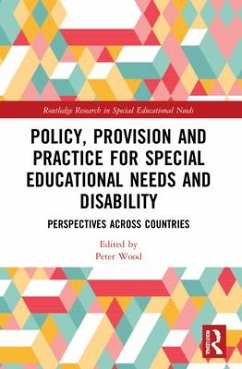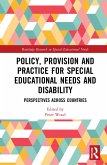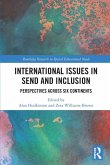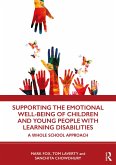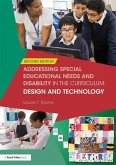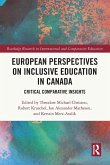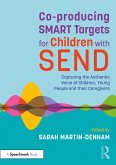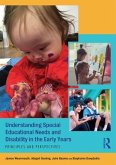Policy, Provision and Practice for Special Educational Needs and Disability
Perspectives Across Countries
Herausgeber: Wood, Peter
Policy, Provision and Practice for Special Educational Needs and Disability
Perspectives Across Countries
Herausgeber: Wood, Peter
- Broschiertes Buch
- Merkliste
- Auf die Merkliste
- Bewerten Bewerten
- Teilen
- Produkt teilen
- Produkterinnerung
- Produkterinnerung
This book showcases the diverse nature of policy, provision and practice for special educational needs and disability (SEND) across different international settings.
Andere Kunden interessierten sich auch für
![Policy, Provision and Practice for Special Educational Needs and Disability Policy, Provision and Practice for Special Educational Needs and Disability]() Policy, Provision and Practice for Special Educational Needs and Disability180,99 €
Policy, Provision and Practice for Special Educational Needs and Disability180,99 €![International Issues in SEND and Inclusion International Issues in SEND and Inclusion]() International Issues in SEND and Inclusion42,99 €
International Issues in SEND and Inclusion42,99 €![Supporting the Emotional Well-being of Children and Young People with Learning Disabilities Supporting the Emotional Well-being of Children and Young People with Learning Disabilities]() Mark FoxSupporting the Emotional Well-being of Children and Young People with Learning Disabilities35,99 €
Mark FoxSupporting the Emotional Well-being of Children and Young People with Learning Disabilities35,99 €![Addressing Special Educational Needs and Disability in the Curriculum Addressing Special Educational Needs and Disability in the Curriculum]() Louise Davies (UK Founder of the Food Teachers Centre)Addressing Special Educational Needs and Disability in the Curriculum55,99 €
Louise Davies (UK Founder of the Food Teachers Centre)Addressing Special Educational Needs and Disability in the Curriculum55,99 €![European Perspectives on Inclusive Education in Canada European Perspectives on Inclusive Education in Canada]() European Perspectives on Inclusive Education in Canada42,99 €
European Perspectives on Inclusive Education in Canada42,99 €![Co-producing SMART Targets for Children with SEND Co-producing SMART Targets for Children with SEND]() Co-producing SMART Targets for Children with SEND50,99 €
Co-producing SMART Targets for Children with SEND50,99 €![Understanding Special Educational Needs and Disability in the Early Years Understanding Special Educational Needs and Disability in the Early Years]() Janice Wearmouth (UK University of Bedfordshire)Understanding Special Educational Needs and Disability in the Early Years46,99 €
Janice Wearmouth (UK University of Bedfordshire)Understanding Special Educational Needs and Disability in the Early Years46,99 €-
-
-
This book showcases the diverse nature of policy, provision and practice for special educational needs and disability (SEND) across different international settings.
Produktdetails
- Produktdetails
- Routledge Research in Special Educational Needs
- Verlag: Taylor & Francis Ltd
- Seitenzahl: 222
- Erscheinungstermin: 25. September 2023
- Englisch
- Abmessung: 234mm x 156mm x 12mm
- Gewicht: 344g
- ISBN-13: 9780367725006
- ISBN-10: 0367725002
- Artikelnr.: 68713075
- Herstellerkennzeichnung
- Libri GmbH
- Europaallee 1
- 36244 Bad Hersfeld
- gpsr@libri.de
- Routledge Research in Special Educational Needs
- Verlag: Taylor & Francis Ltd
- Seitenzahl: 222
- Erscheinungstermin: 25. September 2023
- Englisch
- Abmessung: 234mm x 156mm x 12mm
- Gewicht: 344g
- ISBN-13: 9780367725006
- ISBN-10: 0367725002
- Artikelnr.: 68713075
- Herstellerkennzeichnung
- Libri GmbH
- Europaallee 1
- 36244 Bad Hersfeld
- gpsr@libri.de
Peter Wood is Senior Lecturer in the School of Education at Liverpool John Moore's University, UK. His interest in special educational needs and disability (SEND) stems from his time working in primary schools as a Learning Mentor. Peter's research focuses on emotions and education, and specifically the ways disadvantage, inequality and discrimination frame experiences of social and emotional well-being in the educational space.
1. Introduction: Making the case for the exploration of special educational
needs and disability policy, provision and practice across countries. Part
one: Special education needs and disability within policy. 2. Culturally
and linguistically diverse migrant students with special needs and
disabilities: Essential policies and practices in the USA. 3. Education
policy and inclusive education: People and processes. 4. Inclusive special
needs and disability education: History, policies, practice and challenges
in Kenya and Nepal. Part two: Stakeholder perceptions and experiences of
SEND provision. 5. Special educational needs co-ordinators' perceptions of
effective provision for including autistic children in primary and middle
schools in England. 6. School staff members' and parents' experiences of
the inclusion of deaf children in Malaysian mainstream schools. Part three:
Meeting the needs of SEND children: The role of the learning environment.
7. Inclusion in Norwegian schools: Pupils' experiences of their learning
environment. 8. A language focused approach to supporting children with
social, emotional and behavioural difficulties. 9. Forest school as a space
for risk for children with social, emotional and mental health needs. Part
four: Moving towards inclusive practice. 10. A European consideration of
early school leaving as a process running through childhood: A model for
inclusive action. 11. Teacher education for SEND inclusion in an
international context: The importance of critical theoretical work. 12.
Conclusion: Positioning special educational needs and disability in
contemporary teaching and learning. Index.
needs and disability policy, provision and practice across countries. Part
one: Special education needs and disability within policy. 2. Culturally
and linguistically diverse migrant students with special needs and
disabilities: Essential policies and practices in the USA. 3. Education
policy and inclusive education: People and processes. 4. Inclusive special
needs and disability education: History, policies, practice and challenges
in Kenya and Nepal. Part two: Stakeholder perceptions and experiences of
SEND provision. 5. Special educational needs co-ordinators' perceptions of
effective provision for including autistic children in primary and middle
schools in England. 6. School staff members' and parents' experiences of
the inclusion of deaf children in Malaysian mainstream schools. Part three:
Meeting the needs of SEND children: The role of the learning environment.
7. Inclusion in Norwegian schools: Pupils' experiences of their learning
environment. 8. A language focused approach to supporting children with
social, emotional and behavioural difficulties. 9. Forest school as a space
for risk for children with social, emotional and mental health needs. Part
four: Moving towards inclusive practice. 10. A European consideration of
early school leaving as a process running through childhood: A model for
inclusive action. 11. Teacher education for SEND inclusion in an
international context: The importance of critical theoretical work. 12.
Conclusion: Positioning special educational needs and disability in
contemporary teaching and learning. Index.
1. Introduction: Making the case for the exploration of special educational
needs and disability policy, provision and practice across countries. Part
one: Special education needs and disability within policy. 2. Culturally
and linguistically diverse migrant students with special needs and
disabilities: Essential policies and practices in the USA. 3. Education
policy and inclusive education: People and processes. 4. Inclusive special
needs and disability education: History, policies, practice and challenges
in Kenya and Nepal. Part two: Stakeholder perceptions and experiences of
SEND provision. 5. Special educational needs co-ordinators' perceptions of
effective provision for including autistic children in primary and middle
schools in England. 6. School staff members' and parents' experiences of
the inclusion of deaf children in Malaysian mainstream schools. Part three:
Meeting the needs of SEND children: The role of the learning environment.
7. Inclusion in Norwegian schools: Pupils' experiences of their learning
environment. 8. A language focused approach to supporting children with
social, emotional and behavioural difficulties. 9. Forest school as a space
for risk for children with social, emotional and mental health needs. Part
four: Moving towards inclusive practice. 10. A European consideration of
early school leaving as a process running through childhood: A model for
inclusive action. 11. Teacher education for SEND inclusion in an
international context: The importance of critical theoretical work. 12.
Conclusion: Positioning special educational needs and disability in
contemporary teaching and learning. Index.
needs and disability policy, provision and practice across countries. Part
one: Special education needs and disability within policy. 2. Culturally
and linguistically diverse migrant students with special needs and
disabilities: Essential policies and practices in the USA. 3. Education
policy and inclusive education: People and processes. 4. Inclusive special
needs and disability education: History, policies, practice and challenges
in Kenya and Nepal. Part two: Stakeholder perceptions and experiences of
SEND provision. 5. Special educational needs co-ordinators' perceptions of
effective provision for including autistic children in primary and middle
schools in England. 6. School staff members' and parents' experiences of
the inclusion of deaf children in Malaysian mainstream schools. Part three:
Meeting the needs of SEND children: The role of the learning environment.
7. Inclusion in Norwegian schools: Pupils' experiences of their learning
environment. 8. A language focused approach to supporting children with
social, emotional and behavioural difficulties. 9. Forest school as a space
for risk for children with social, emotional and mental health needs. Part
four: Moving towards inclusive practice. 10. A European consideration of
early school leaving as a process running through childhood: A model for
inclusive action. 11. Teacher education for SEND inclusion in an
international context: The importance of critical theoretical work. 12.
Conclusion: Positioning special educational needs and disability in
contemporary teaching and learning. Index.

